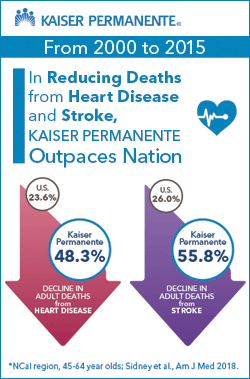Kaiser Permanente's report in NEJM AI details insights from a large-scale rollout of ambient AI clinical documentation technology.

Ongoing Cardiovascular Care Initiatives Reduce Deaths from Heart Disease, Stroke
Study Finds Kaiser Permanente Northern California Numbers Outpace the Nation
Death rates from heart disease and stroke in adults under age 65 are lower and dropping faster for Kaiser Permanente members in Northern California than in the rest of the United States, according to new research published recently in the American Journal of Medicine.
Heart disease and stroke are leading causes of death in the United States. The new study, “Comparative Trends in Heart Disease, Stroke, and Total Mortality in the United States and a Large, Integrated Healthcare Delivery System,” reinforces the effectiveness of Kaiser Permanente’s ongoing cardiovascular care initiatives.
 The researchers compared mortality data from the Centers for Disease Control and Prevention (CDC) with Kaiser Permanente Northern California data. They found heart disease death rates among adults aged 45 to 65 fell by 48.3 percent in 3.2 million Kaiser Permanente members from 2000 to 2015, compared to a 23.6 percent decline nationwide. Stroke-related deaths for the same age group fell by 55.8 percent among Kaiser Permanente members compared to a nationwide drop of 26.0 percent.
The researchers compared mortality data from the Centers for Disease Control and Prevention (CDC) with Kaiser Permanente Northern California data. They found heart disease death rates among adults aged 45 to 65 fell by 48.3 percent in 3.2 million Kaiser Permanente members from 2000 to 2015, compared to a 23.6 percent decline nationwide. Stroke-related deaths for the same age group fell by 55.8 percent among Kaiser Permanente members compared to a nationwide drop of 26.0 percent.
Replicated by Others
The study also showed that overall rates of heart disease and stroke mortality are lower for these Kaiser Permanente members than in the rest of the country. In 2000, for instance, U.S. heart disease mortality was 39.3 percent higher than the Kaiser Permanente group, while stroke mortality was about the same for both. But by 2015, U.S. heart disease mortality was 43.2 percent higher and stroke mortality 13.3 percent higher than among the Kaiser Permanente members.
“We think elements of Kaiser Permanente’s approach can be replicated by other health care systems to lower mortality rates,” said lead author Stephen Sidney, MD, MPH, senior research scientist with the Kaiser Permanente Northern California Division of Research. “Most heart disease and stroke-related deaths occur in people over 65, but mortality is still high for middle-aged members, so focusing on this vulnerable group could save many lives.”
For example, the CDC’s “Million Hearts” program include elements of Kaiser Permanente’s overall cardiovascular care initiatives in the Million Hearts’ Hypertension Control Change Package for Clinicians.
Dr. Sidney believes improved management of high blood pressure could be especially effective, given the condition’s prevalence and the relative ease and affordability of treatment. Introduced in 2001, Kaiser Permanente’s hypertension management program in Northern California nearly doubled the rate of blood pressure control in adults with hypertension by 2009. Likewise, two previous studies showed that the rate of more severe but less common heart attacks fell about three quarters from 1999 to 2014 among the region’s members.
“These studies add to a growing body of evidence in support of Kaiser Permanente’s comprehensive approach to cardiovascular health, which combines high-quality preventive and therapeutic interventions,” said senior author Jamal S. Rana, MD, PhD, cardiologist at Kaiser Permanente Oakland Medical Center and adjunct researcher at the Division of Research.
PHASE Program
In addition to its hypertension management program, Kaiser Permanente’s cardiovascular care initiatives include the Preventing Heart Attacks and Strokes Every day (or PHASE) program, which uses medications and lifestyle changes to improve heart health. The PHASE program, or some form of it, is used to help improve the heart health of patients in all Kaiser Permanente regions across the country.
This study was conducted in the Cardiovascular Research Network, a consortium within the Health Care Systems Research Network. In addition to Drs. Sidney and Rana, co-authors were Michael E. Sorel, MPH, Charles P. Quesenberry, PhD, Matthew D. Solomon, MD, PhD, Mai N. Nguyen-Huynh, MD, MAS and Alan S. Go, MD, of the Kaiser Permanente Northern California Division of Research; and Marc G. Jaffe, MD, of Kaiser Permanente South San Francisco Medical Center.


